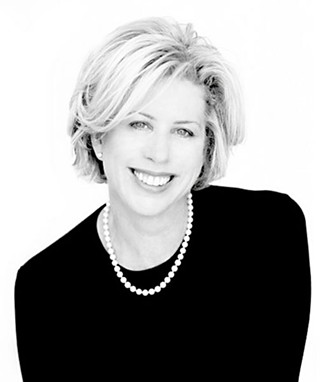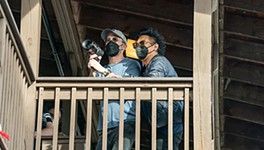Women's Writes
From 'Thelma & Louise' to 'Nashville,' Callie Khouri has honed the art of telling women's stories
By Marjorie Baumgarten, Fri., Oct. 25, 2013
It was sometime in late April or early May 1991 when I attended an advance screening of the latest film by Ridley Scott, the director of Alien and Blade Runner. I had hoped to be wowed by his new project, Thelma & Louise, much as I had been by the audacious look and social relevance of those previous films. And I was. Scott had made another great movie. Geena Davis and Susan Sarandon, as well, left mind-blowing impressions as the two women whose friendship drives the plot. But the name that tripped from my tongue over the following weeks during which I babbled to all who would listen about this amazing new movie that was soon to come out was that of Callie Khouri, the debuting screenwriter of Thelma & Louise. This unknown writer with the alliterative name became something of a chant for me in the weeks building up to the film's release in late May.
As debuts go, Khouri's was quite spectacular. The secret was out; her screenplay for Thelma & Louise garnered an Oscar, a Golden Globe, a Writers Guild of America Award, and a PEN Literary Award. Khouri's follow-up was the screenplay for Something to Talk About, which came out in 1995 and starred Julia Roberts as a woman who reassesses her life in the wake of her husband's infidelity. The year 2002 brought Khouri's directorial debut with Divine Secrets of the Ya-Ya Sisterhood, which is another film about female friendships (starring Sandra Bullock and Ashley Judd) that she adapted for the screen from Rebecca Wells' bestseller. These days, Khouri's work is beamed into our living rooms with the TV series she created and produces: Nashville, a nighttime drama about love and frenemies in the music city. The hit show, which stars Connie Britton and Hayden Panettiere, is now in its second season, and Khouri also writes and directs some of the episodes.
Callie Khouri will attend the Austin Film Festival this weekend to receive the organization's Distinguished Screenwriter Award. "I'm trying to pretend like they've not just made a horrible mistake," she confessed modestly when we spoke with her by phone in advance of the festival. Excerpts from our conversation appear below.
Austin Chronicle: How have you found the transition from movies to television and a hit show like Nashville?
Callie Khouri: It's very different, but right now television is where it's at. It just goes so much faster. There are so many more people involved. And for network, we are doing 22 shows, and it doesn't wait. It's got to be on television, you know what I mean?
AC: I do, I work at a newspaper, where there's a big, blank hole if you're not done with your story.
CK: Right. So that's been a little bit of an adjustment. With features, it's not like you have all the time in the world, of course, but you have some time. With TV, every single task that's set in front of you, you have to do it right now or else you're just going to be simply out of time.
AC: You're finding time somewhere because now you're also directing some episodes.
CK: But, of course, I'm not writing all of them. Fortunately, we have a staff of really wonderful writers. The thing I did recently was the first time I have ever directed an episode that someone else had written, and that was really fun. I have to say I really loved it. It was a lot less pressure, and when the actors want to talk about the script, there's somebody there to help you so you're not having to stop and make adjustments by yourself. And you're not having to rewrite scenes when you're finishing up on the set that night. But it's still the most fun for me to write and direct my own stuff.
AC: Do you find working in television more amenable to the telling of women's stories than film?
CK: Well, certainly right now I do. You can tell women's stories, I think, if you want to do an independent feature, but I don't see any of the major studios ever doing it. Not really. [With the rare exception,] it's just not something that's really on the slate of any major studio. You can make movies for girls. The young girl audience will show up – because they can. But the adult female audience is a much trickier proposition. You have to get them into the theatre on Friday night. In droves – the same way kids turn out for Iron Man and whatever comic book. It's just never going to happen.
AC: I think if anyone can figure it out, it's you.
CK: This is what I'm doing right now because it gives me an ability to flex that muscle, and it's fun to get to tell a long-term story. I haven't ever done anything that's over an hour and a half. I'm loving this.
AC: One of the things I've always respected so much about your career is that you haven't shied away from recognizing that you wanted to tell women's stories. You have embraced that calling rather than fear the pigeonholing.
CK: I did fight against it for a while, until somebody pointed out to me that it's what I do best and nobody else is really doing it. Not nobody else, that's not fair to say. There are some great female filmmakers out there who are absolutely every bit as interested and concerned and trying every bit as hard as I am. I've said this a million times: The female audience is underserved. If it's what I do, and what I do well, why should I fight it? Why shouldn't I instead try to make some inroads into making it into a profitable business for someone?
Callie Khouri appears at multiple Austin Film Festival events this weekend, including Saturday's Conversation With the 2013 Awardees (2:15pm, InterContinental Stephen F. Austin, Ballroom) and an individual conversation the next afternoon (noon) at the same location. See www.austinfilmfestival.com for complete details.











